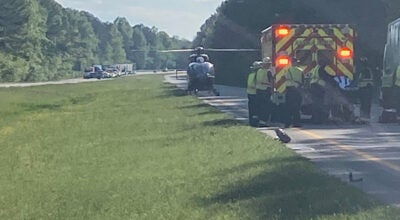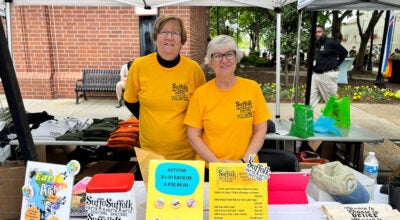Beware phone scams
Published 8:52 pm Thursday, October 10, 2013
A Suffolk woman is warning her neighbors of phone scammers who called her home trying to get her to send them money.
Linda Rawlinson said she received two phone calls at her home. The first caller said he was Michael Washington, and the second said she was Lydia Johnson.
“She said she’s calling from Las Vegas with the Winners International Awards,” Rawlinson said. “They want to send me a million and a half dollars and a Mercedes-Benz.”
Rawlinson said the callers told her all she would have to do to claim the car and cash would be to go to Walmart and put $300 on some sort of card and mail it off.
“I hadn’t heard of anything like that going on,” Rawlinson said. Suspicious, she called the Suffolk Police Department.
The police informed her it was a scam and said they had one other similar call recently, Rawlinson said.
“It seems like to me it would be worth the public knowing,” she said.
Suffolk Police Detective Gary Myrick advised against giving out information to con artists.
“The most important thing is not to provide any information,” he said. “The old adage holds true. If it sounds too good to be true, it’s probably not true.”
He also encouraged people who have received suspicious phone calls to report them to the police department.
According to the FBI, asking a potential victim to send money in order to release a bigger prize is a common theme of telemarketing fraud. Others include asking the potential victim to “act now,” give out their credit card or bank account number or have a check picked up by a courier. Unscrupulous callers also may say the victim does not need to consult with their family, lawyer, accountant or consumer protection agency.
Some tips from the FBI for avoiding telemarketing fraud include the following:
- Don’t buy from an unfamiliar company. Legitimate businesses understand that you want more information about their company and are happy to comply.
- Always ask for and wait until you receive written material about any offer or charity. If you get brochures about costly investments, ask someone whose financial advice you trust to review them.
- Always check out unfamiliar companies with your local consumer protection agency, Better Business Bureau, state attorney general, the National Fraud Information Center or other watchdog groups. However, not all bad businesses can be identified through these organizations.
- Obtain a salesperson’s name, business identity, telephone number, street address, mailing address, and business license number before you transact business. Some con artists give out false names, telephone numbers, addresses, and business license numbers. Verify the accuracy of these items.
- Before you give money to a charity or make an investment, find out what percentage of the money is paid in commissions and what percentage actually goes to the charity or investment.
- Don’t pay in advance for services. Pay for services only after they are performed.
- Be wary of companies that want to send a messenger to your home to pick up money, claiming it is part of their service to you. In reality, they are taking your money without leaving any trace of who they are or where they can be reached.
- Always take your time making a decision. Legitimate companies won’t pressure you to make a snap decision.
- Don’t pay for a “free prize.” If a caller tells you the payment is for taxes, he or she is violating federal law.
- Be sure to talk over big investments offered by telephone salespeople with a trusted friend, family member or financial adviser. It’s never rude to wait and think about an offer.
- Never respond to an offer you don’t understand thoroughly.
- Never send money or give out personal information such as credit card numbers and expiration dates, bank account numbers, dates of birth, or Social Security numbers to unfamiliar companies or unknown persons.
- If you have been victimized once, be wary of persons who call offering to help you recover your losses for a fee paid in advance.
- If you have information about a fraud, report it to state, local or federal law enforcement agencies.






